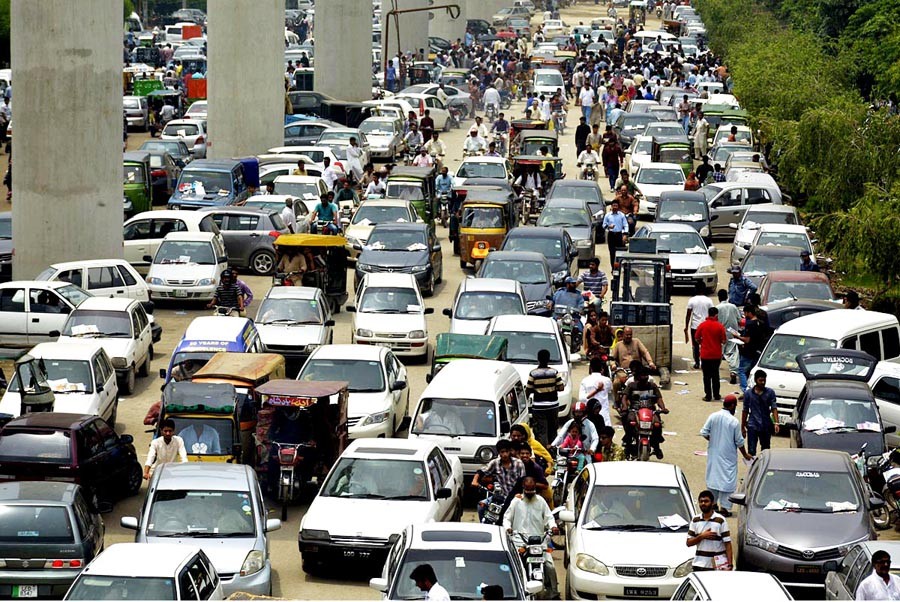
The private sector can do a lot in bringing down the levels of pollution

When we talk about climate change and ways to tackle it we hold the government responsible for failing in this regard. Too little is discussed about how the individual and institutional polluters can make things good and set an example for others to follow.
These include ordinary citizens, commuters, industry, service sector, etc. As the demand for fuel is rising with increase in population and increasing cost of production, fuels such as used tyres, rubber shoes and poultry waste are used. The increasing number of cars also means increased burning of fuel and emission of harmful gases.
In this context, a look at how different groups are trying to clean their house or should act becomes necessary. To start with, we take the example of brick kilns in Pakistan. These kilns spread pollution on a large scale. The low quality coal they use and the smoke emitted into air without treatment are reasons why they are called one of the biggest polluters. Brick kilns owners are working on plans to remove this stigma.
Shoaib Khan Niazi, President All Pakistan Brick Kiln Association (APBKA), explains that to combat climate change a new model called Zigzag Brick Kiln has been introduced in Raiwind, Road Lahore as a pilot project. This technology reduces consumption of fuel to 3000 ton to 2500 ton per day and the fuel efficiency is 40 percent.
"Brick kilns emit thick black smoke containing various air pollutants, including carbon dioxide, carbon monoxide, sulphur dioxide, nitrogen oxide, etc. These pollutants help form smog. The new technology adopted from Nepal and being introduced in Pakistan reduces 70 percent carbon emissions," claims Niazi.
He demands the government should give subsidy to owners of brick kilns so that they can adopt modern technology. According to him, brick kilns sector is contributing 1.50 percent to Gross Domestic Production (GDP).
Read also: Editorial
Another development is that APBKA has recently held a meeting with the World Bank (WB) regarding conversion of conventional kilns to model kilns in the country. Unfortunately, the government has done nothing. The government of Punjab has not provided any financial support or incentives to brick kiln owners where more than 10,000 kilns are working on conventional methods.
There is criticism on Punjab Chief Minister Shahbaz Sharif for not admitting negligence in combating pollution while fixing responsibility on farmers and the Indian Punjab government.
What about car pooling and use of renewable energy? Schools are using diesel generators. Traffic is blocked in front of the school in the mornings because everybody wants to commute in a car. Car pooling is almost non-existent.
Kashif Adeeb Javedani, President All Pakistan Private Schools’ Management Association (APPSMA), says two percent out of 95,000 private schools registered with them in Punjab have shifted to solar panels to combat climate change. "We are trying to convert all schools on solar energy. According to him, some private schools can afford solar panels but public schools cannot.
The excess electricity produced by solar panels can be sold back to Wapda or adjusted against units consumed from the national grid. This can help schools save electricity cost, which can also bring down tuition fees.
Javedani says APPSMA encourages car-pooling system to combat climate change. The management encourages students to use school buses instead of their own vehicles. If they come on school buses the problems of traffic mess will also be solved.
"Unfortunately, due to security threats, parents do not trust poor public transport system or buses provided by school administration. This is why car-pooling system has failed badly," he explains.
Javedani believes the government should run awareness campaigns about the benefits of car-pooling. "In developed countries like the US there are special fast lanes for vehicles carrying more than two occupants. This is the incentive they give, we can think something that is relevant in our environment."
Only 20 percent of 60,000 industries in the country are environment friendly. The industries which export their products in the international markets adopt mitigation measures. "The rest of the industries in the country even don’t think about the mitigation measures," says Ahmad Rafay Alam, an advocate and expert in environmental affairs.
Rafay explains, "In leather industry, for instance, waste treatment plants have been installed because of the international pressure. Industrialists provide their workers with gloves and masks to save them according to the international demands. While dying clothes different chemicals are used. Health of workers is affected."
He says "cotton factories have been spreading air pollution in the country. Filters have been installed to control air pollution. The plants of the factories are outdated and the mitigation measures taken by the factories are outdated. If they don’t ensure compliance to environmental standards, their products would not sell in the international market. The damage that cement factories do is everybody’s knowledge but hardly anyone dares to challenge their powerful owners."
One good development is that All Pakistan Textile Mills Association (APTMA) is trying to ensure recycling and reusing water during the manufacturing process.